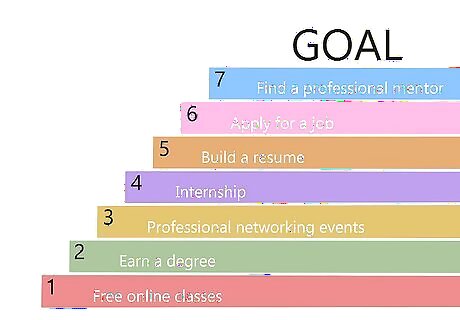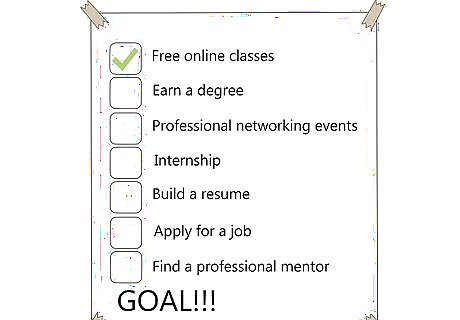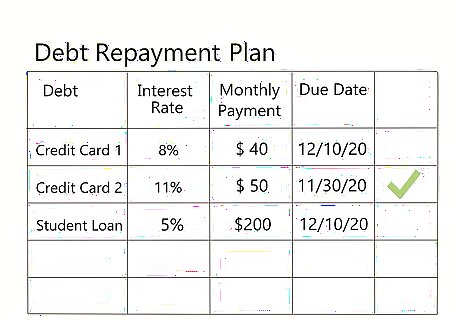
views
Raising Your Personal Standards

Use positive self-talk to motivate yourself to live better. You likely have a negative voice in your head that sometimes criticizes your looks, intelligence, talents, or accomplishments. Ironically, this critical voice is often trying to protect you from embarrassment and heartache by convincing you to play it safe, even if that holds you back from your dreams. If you listen to this negative voice, you'll likely end up with low standards for yourself because you'll be too afraid of failure to go after what you want. Instead, replace this negative voice with positive self-talk by telling yourself you’re strong, capable, and totally amazing. You might tell yourself things like, “I can do anything I set my mind to,” “It’s okay to make mistakes as long as I learn from them,” or “I'm worthy of love.” It's okay if you slip back into negative self-talk sometimes. Gently remind yourself to use your positive self-talk and try to do better moving forward.

Create a sleep routine to help you feel rested. Being tired all of the time can make it hard to live your best life. Additionally, feeling exhausted makes it harder for you to make healthy choices, like choosing baby carrots for a snack instead of candy. Set a bedtime for yourself that allows you to get 7 to 9 hours of sleep every night. Spend 30 minutes to an hour before bed winding down with relaxing activities like reading, bathing, or listening to calming music. Try different ways to relax before bed to find what works for you. For instance, you might find that reading is too stimulating for you, but a nightly meditation might do the trick. Find what helps you sleep best. Make a list of reasons why extra sleep is so important to help you stay motivated to sleep more.

Make small changes to your diet so you eat healthier meals. You probably know that eating nutritious foods is healthy for you. While improving your diet is a great goal, trying to change how you eat all at once can be really challenging, and you could be setting yourself up for failure. Instead, focus on making small switches. Here are some ideas for getting started: If you normally skip breakfast, make overnight oats or buy some yogurt so your breakfast is ready in the morning. For snacks during the day, skip the candy and salty snacks. Instead, choose baby carrots with ranch dressing, apple slices with peanut butter, or string cheese with a handful of grapes. At dinner, fill half your plate with veggies so you’ll be less hungry for other less healthy foods. Place notes or quotes around your kitchen and workspace to remind yourself how healthy eating improves your life. Your notes could say, "Fruits and veggies = energy," "A healthy diet creates a vibrant life," or "I put good things in my body so I feel my best."

Set reasonable exercise goals each week. Exercising is important for your health, but doing too much at once can be harmful for your body. Choose an exercise that you enjoy, and find easy ways to work it into your day. You only need about 30 minutes of exercise 5 days a week, and it’s okay to break this up into 10- to 15-minute blocks if you have a busy schedule. You might go for a 15-minute brisk walk during lunch and after dinner. If you like something more structured, you could join a gym, take a dance class, or follow a video workout. On the weekend, you might go for a hike or try something fun, like playing beach volleyball. If you have access to a pool, swimming is a great way to exercise. Exercise with a friend to make it more fun. Additionally, pick an activity you like so you look forward to it every day.

Pair new habits with something you already do to help them stick. Creating a new habit is super hard, and you’re likely going to have slip-ups. However, you might be able to increase your chances of making your new habit permanent by doing it at the same time as something you already do. Try to pair your new habit with something it naturally goes with. Here are some examples of how to make this work: Go on a 15-minute brisk walk when you get out of your car after work. Cut up veggies for breakfast and lunch while you’re preparing dinner. Do calisthenics while you watch your favorite TV show.

Set up your environment to support your new habits. You might not realize this, but your environment can trigger your habits. If you keep your environment the same, it might be hard to break out of the bad habits that brought on your low standards. Rearrange your home to support the habits you want to encourage and the life you want for your future. As an example, you might place your workout gear where you can easily grab it or your meditation pillow in the corner of your living room as a reminder to use it daily. If you’re trying to learn a new skill or work on a hobby, put your tools where you can easily access them. For instance, put your art supplies on a portable cart so you can pull them out every day or keep your knitting in a basket by your sofa.

Try new things to help you leave your comfort zone. Exploring new ideas and activities can help you grow as a person and evolve your standards. Make a list of new things you want to try, then start checking them off. For instance, you might try the following: Sign up for a class or workshop, either in person or online. Take a new route to work. Eat at a restaurant you normally wouldn’t try. Talk to a stranger in public. Go to a live music event. Buy a new outfit that’s a style you’ve always wanted to try. Start a new hobby.

Attend classes or workshops to learn new skills. Learning new things can help you as you work to raise your standards. Look for classes or workshops in person or online that support your goals. Take advantage of free offerings, but don’t be afraid to invest in yourself if you can. You can find free classes online through services like edx.org. Get creative when picking classes. As an example, if you want to make friends or meet a new romantic partner, you might take an improv class to help you feel more comfortable talking to people and thinking of things to say.
Improving Your Relationships

Identify your expectations for a romantic relationship. You deserve a partner who treats you well and loves you as you are. When you like someone, it's easy to overlook the reasons they're wrong for you, but knowing your expectations can help. Imagine your perfect partner and define the qualities they'll have. Then, list the things you won't tolerate in your partner. For instance, you might want a partner who will put you first in their life, who puts equal effort into the relationship, and who speaks to you with kindness. Things you won't tolerate could include things like lying, name-calling, and criticizing your looks.

Figure out what you want out of your friendships. Your friends are likely some of your closest relationships and may even be like a family to you. Unfortunately, friends can sometimes take advantage of you if you tolerate them treating you badly. Think about the friendships you idolize, whether they're fictional or real, and identify what those relationships have in common. Then, write down a list of qualities your friendships should have. For instance, you might want friends who will listen to you without judging, who will offer both positive and negative criticism with love, and who will be there for you when you need them. Additionally, you likely want friends that will cheer you on rather than dragging you down.

Decide how you want your family to treat you. Your family can be both a comfort and a source of pain. Setting healthy boundaries with your family can help you build better relationships with them and may help you limit bad experiences with them. Picture how you want your interactions with family members to go to figure out what you expect from them. Additionally, consider how close you want your relationship to be with them. In general, you might hope your relatives love you unconditionally because you're family. This could mean they don't criticize you for making mistakes and they cheer you on toward your goals. You may also want a close relationship with your siblings or cousins where you can count on them in a time of need. If your family members have different values, you might want them to accept your opinions and to avoid controversial subjects when you're together.

Discuss your boundaries with the people in your life as needed. You don’t need to send everyone you know a list of expectations. However, you might want to have a conversation with people who often violate your boundaries. Tell them that you really like having them in your life, but you aren’t okay with how you’re being treated. You might say, “I really value our friendship, but I want you to keep your comments about my clothes to yourself,” or “I love spending time with you, but I wish you wouldn’t make jokes at my expense.” When you’re dating a new partner, you could say things like, “I want a relationship where we take turns making plans for dates,” or “I really want a partner who checks on me every day, even if it’s just to say ‘Good morning’ and ‘Good night.’”

Stand up for yourself if someone violates your boundaries. Your friends and loved ones may still make mistakes that hurt you, even if they’re trying hard to respect your boundaries. When this happens, you have a right to stick up for yourself and tell them it’s not okay. Once you talk to someone about your boundaries, don’t let them get away with ignoring them. Let’s say you asked your sister not to make jokes about your love life. If she still makes a joke, say, “I told you that’s not funny. If you’re going to tease me, I’m going home.” Similarly, you might be dating someone who only contacts you when it’s convenient for them. Next time they text or call you, you might say, “I’ve been having fun hanging out with you, but I’m not okay with dating around your schedule.” Remember to use positive self-talk to motivate you to stand up for yourself. You deserve the best.

Surround yourself with people who let you be yourself. When you have low standards for yourself, you might feel pressured to hide parts of who you are to please others. This is totally unfair to you and the world. You’re a unique, amazing person, so let people get to know the real you. No one can please everyone, so you might lose a few friends who just aren’t right for you. However, this will open the door for you to meet people who value you for who you are.

Spend less time with people who bring you down. You might have a few people in your life who try to undermine your confidence or are just negative in general. Unfortunately, these people can keep you trapped in a cycle of low standards. Try to limit how much time you spend around them so they can’t sabotage you as you make positive changes. You don’t need to cut people out of your life. However, you might turn down plans with them if you think they’re going to be a downer or could wait longer before responding to their texts or calls.
Building Your Career and Finances

Identify your career goals. It’s hard to get your dream job if you don’t know what it is. Consider what type of work you want to do and how you’d like to spend your day. Then, look for careers that fit your preferences. Set a goal for getting the perfect job for you. For example, you might decide to go into nursing if you want to help people and enjoy a fast-paced environment. If you like working on a computer and enjoy being creative, you might go into computer programming. On the other hand, you might like whipping up innovative recipes and making people happy, which would make you a great chef. You might have to work at a few different jobs before you reach your ultimate goal. That’s totally normal, and each of your jobs can act as a stepping stone to your dreams. Similarly, you may not be able to reach your dream job, especially if it's a very challenging goal. However, working for what you want and taking related jobs along the way will still be fulfilling.

Break your career goals into small steps so they're easier to accomplish. Reaching your career goals can feel challenging, especially when you’re just getting started. Don’t worry about all of the work you need to do. Instead, make a list of each small step you’ll need to take to reach your goal. For instance, your steps might include the following: Take professional development classes. Earn a degree. Attend professional networking events. Get an internship. Build a resume. Apply for at least 2 jobs each week. Find a professional mentor.

Check off the small steps toward your career goals. It’s okay if it takes you a long time to build your career. What’s important is that you’re working toward your dream. Once you have your list of steps, treat each of the small steps as a mini-goal. Celebrate each time you accomplish a mini-goal to help you stay motivated to keep working. For instance, you might start by enrolling in a free online class or workshop that’s related to your career goals. At the end of the class, celebrate your progress toward your goal! Another great first step is to talk to someone in the field where you want to work and ask for their advice. This person could even become a mentor.

Make a budget so you can start building wealth. A budget might not sound fun, but it’s a great tool for helping you live a better life. If you want to create your budget yourself, add up how much money you make and list all of your monthly expenses. Subtract your expenses from your income to find out how much extra money you have to spend. Set aside some of your extra money for savings and some for spending. For budgeting help, download an app, such as Mint, PocketGuard, or Goodbudget, to help you track your money. If you want a very detailed budget, create spending categories to better track your money. This can help you see where your funds are going so you can make changes if necessary. If you don’t make enough money to cover your bills, look for ways to make extra money. You might get a new job or sell items you own to help pay down debt.

Begin a debt repayment plan if you owe money. Carrying around debts can be super stressful and might make it harder to reach your financial goals. To create a debt repayment plan, write down all of the money you owe and the cost of your monthly payments. Then, calculate how much money you can allocate toward your debts each month. Make sure you’re paying more than the minimum. Pay down your debt with the highest interest rate first. For instance, if you have 2 credit cards that have 11% interest and 8% interest, you should pay the minimum payment on the card with 8% interest so you can pay more on the higher interest card. It’s totally normal to have debt, so you’re not alone.

Start saving small amounts of money to build an emergency fund. You probably know that saving money is important, but it’s super hard to do, especially if you’re struggling to pay bills. Don’t worry about how much you “should” be saving right now. Instead, set a small goal that you can afford, whether it’s $5 a month or $100 a month. Focus on getting in the habit of saving and increase the amount when you can. Generally, an emergency fund has enough money to cover 6 months of your expenses in case of an emergency, like losing your job. It might take you a long time to save up that much money, so try not to get overwhelmed if you’ve just gotten started. If you’re really strapped for cash, see if you can cut out something small from your normal spending, like a coffee drink or name brand groceries, so you can put a few bucks aside for savings. You might also look for ways to earn a little extra cash, like babysitting or pet sitting for someone. To keep you motivated to save, make a list of long-term goals that saving might help you accomplish, like financial freedom or a dream vacation. You could also create a vision board with pictures that represent your future life.




















Comments
0 comment